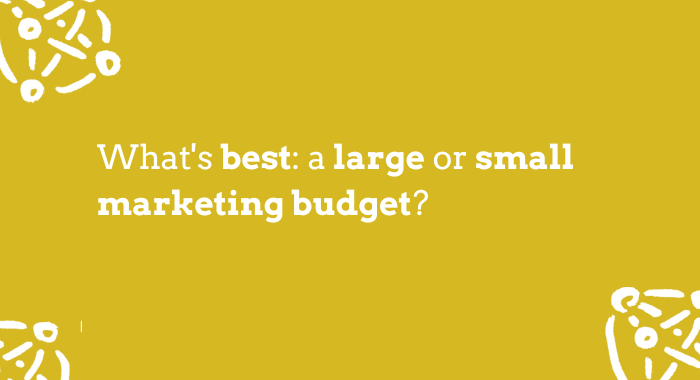Is it better to have a large or small marketing budget?

Asking whether it's better to spend a lot or a little money on marketing probably seems a bit daft. Surely more is better?
Not necessarily.
I've worked with thousands of tourism businesses over the years, from individual B&Bs to five-star hotel chains, from private houses and gardens to grand stately homes. Less than 10% of them have a significant marketing budget, even the large organisations.
Almost everyone believes they need a bigger budget. But is that really true?
How much should you spend on your marketing?
I'll answer the question about large or small marketing budgets in a moment. First, the 'official' view (no-one really knows where this came from - probably marketing agents looking for business!)
Specialists used to suggest that you 'should' allocate a marketing budget of 10 - 20% of gross revenue. This was certainly the case for many corporate businesses, but smaller organisations have always struggled to spend that much.
Now it's an even greyer area: social media, some PR, mailings can all be either free or very low cost. But they take time, and time is money.
It's not easy to specify a fixed budget. Some other observations...
I really started to think about the impact - or lack of impact - of large marketing campaigns when a national tourist board faced big budget cuts several years ago. They suddenly had a much smaller marketing budget to work with, and yet their marketing massively improved. They really thought about their target markets and used more sophisticated segmentation. They actively used their research to consider the impact of their activity and looked at how to improve it. Perhaps most importantly, they become much more creative, developed more industry partnerships and put more thought into activity.
Large budgets mean businesses can afford to advertise, perhaps to work with external agencies. Marketing campaigns (often short, concentrated marketing efforts using multiple channels such as advertising, PR, social media and additions to websites) are possible.
But.
Not all advertising works.
Not all 'flash' expensive marketing is well thought-out.
Shorter term campaigns can lead to an increase in business, but it might not be sustained.
There's a need to keep coming up with new ideas, to keep grabbing attention in dramatic ways, out-doing the competition by out-spending them.
Bigger marketing budgets are not always best.
I've seen some brilliant marketing on very small budgets. Factors that make marketing most effective include:
Careful targeting - really understanding your customers. This can be easier for small businesses who really know their customers
Consistent messages, and building a strong personal reputation - this takes time, not necessarily money. Some simple activities that are frequently repeated can work just as well over time. There are fewer sharp increases in revenue, but more sustained longer-term growth.
Imagination and creativity, real passion about a product, business or place are really effective - big budgets don't guarantee any of these.
Marketing has massively changed over the last ten years. Authenticity is essential. Consistency is vital. Reputations are key.
The best marketing takes thought and time, not necessarily big budgets. I often recommend businesses to do everything else before they spend on advertising.
So you don't need to splash the cash. But you do need to do something which is more important: invest your time.


0 comments
Leave a comment